Hurricane Michael: Returning to a city that no longer exists
- Published
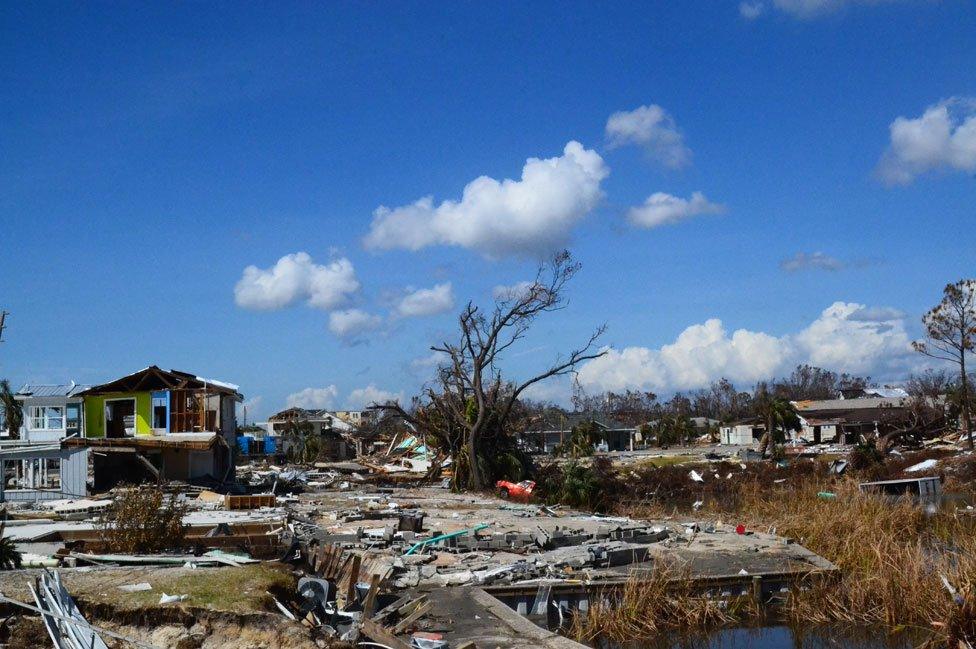
The tiny community of Mexico Beach was virtually flattened by Hurricane Michael

Families have started to return to Mexico Beach, a Florida town devastated by Hurricane Michael last week. Many are finding their homes in ruins; others, no home at all.

The scream was heard from a distance - "Look!" - and Jaques Sebastião, broom in his hand, quickly walked through the rubble that was once the family's home in Mexico Beach to where his wife, Bela, pointed to the ground.
"It's Mother Teresa," she euphorically told him, and picked the small, surprisingly unbroken, statue of the saint, bought during a trip to Rome years ago.
Ms Sebastião removed some of the dust from the sculpture's face and carefully carried it to the surface of the washing machine, several feet from its former place, where they put the very few things they had been able to find.
These were her "little treasures", the 46-year-old said, as she rested Saint Teresa alongside three other slightly damaged religious statues. She then grabbed her black gloves and went back to digging through the sand and debris, under a merciless Florida sun, looking for the rest of her collection.

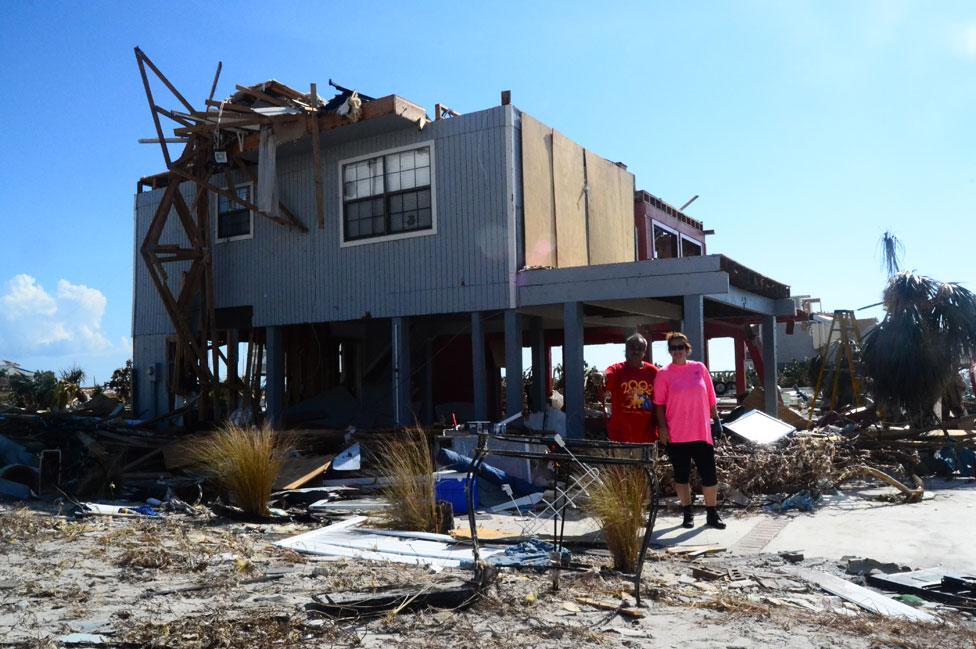
Before returning to Mexico Beach, Jaques and Bela Sebastião had located their destroyed house in stunning aerial pictures

This was the first time the couple, who had moved here just in August, returned to this beachfront community that was virtually flattened by Hurricane Michael, one of the most powerful in US history.
The third floor of their house was blown away by the category four storm that brought winds of 155mph (250 km/h), while a powerful wall of water presumably helped destroy its ground level, taking everything with it.
Very little of what was still standing would likely be of any use. "I heard on the news that it looked like somebody had dropped a bomb here. It's like [it was] a bunch of bombs," 60-year-old Mr Sebastião said.
Before arriving, they had located their house in stunning aerial pictures of the destruction and had a sense of what was - and, perhaps as important, was not - waiting for them. Yet, they were shocked. "You see the damage but it's nothing like being here," he said. "It's much worse."

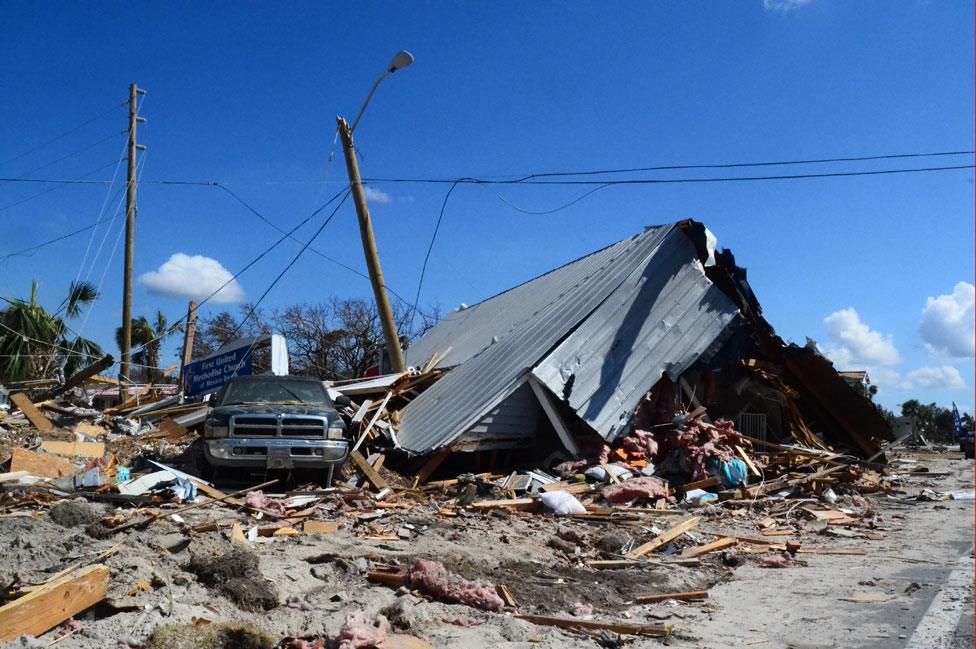
Michael was one of the most powerful hurricanes in history to hit the US

On Wednesday, residents began to see by themselves the damage of what has been described as "ground zero". Nobody could stay and there was almost no sign that people would be moving back in anytime soon. (There was no electricity and water, and mobile phones were slowly working again thanks, in part, to a drone that provided signal.)
"It looks like a war zone," Bela Sebastião said. They were one of the last ones to evacuate, they said, after officers went door to door in the hours before Michael strengthened, urging people to leave.
Most of their immediate neighbours did go but dozens of residents defied the orders and stayed, including those who had been through other hurricanes before. When it became clear that Mexico Beach would be directly hit, for some, it was too late.
Two deaths have been confirmed so far, of a woman and a man who lived separately, and whose bodies were found under the rubble. (The couple did not personally know any of the victims.) Across Michael's catastrophic path, at least 26 people were killed in four states, and dozens of others were said to be unaccounted for.

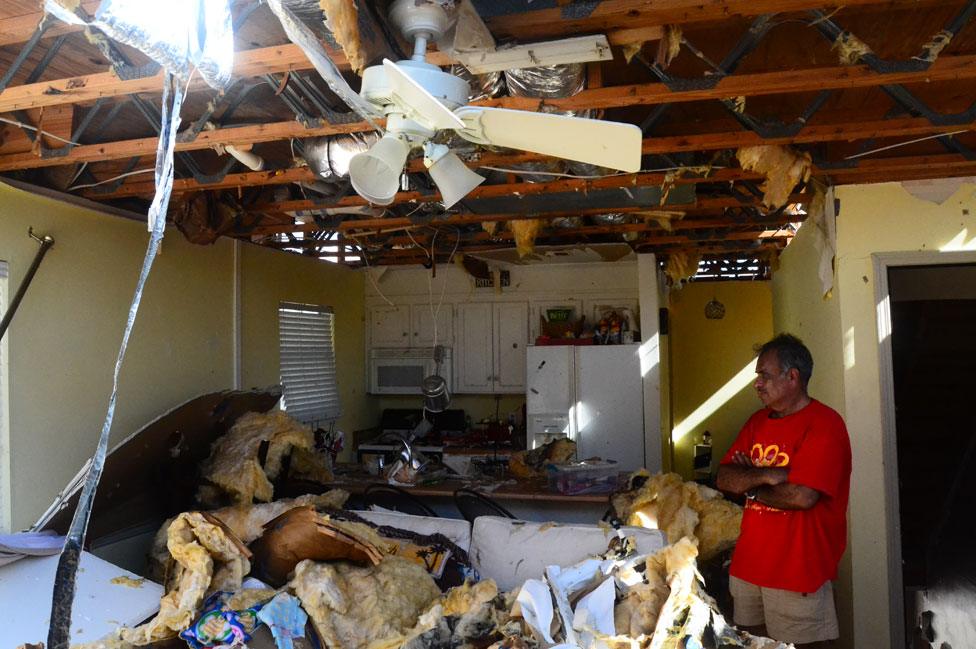
In Jaques Sebastião's kitchen, cans of drinks and boxes of food somehow stayed untouched on the top of the fridge

With each and every discovery, Jaques and Bela Sebastião shared surprise and sadness. A broken piece of a gift from a close friend that brought back good memories, or a fragmented object that belonged to one of their three grown-up sons, two of them who lived abroad.
"A lot of things I can replace," said Ms Sebastião, fighting tears. The worst for her would be losing pictures of her father, who died in 2011, that nobody else had.
The couple, at least, had found their home. Others had come back to nothing.

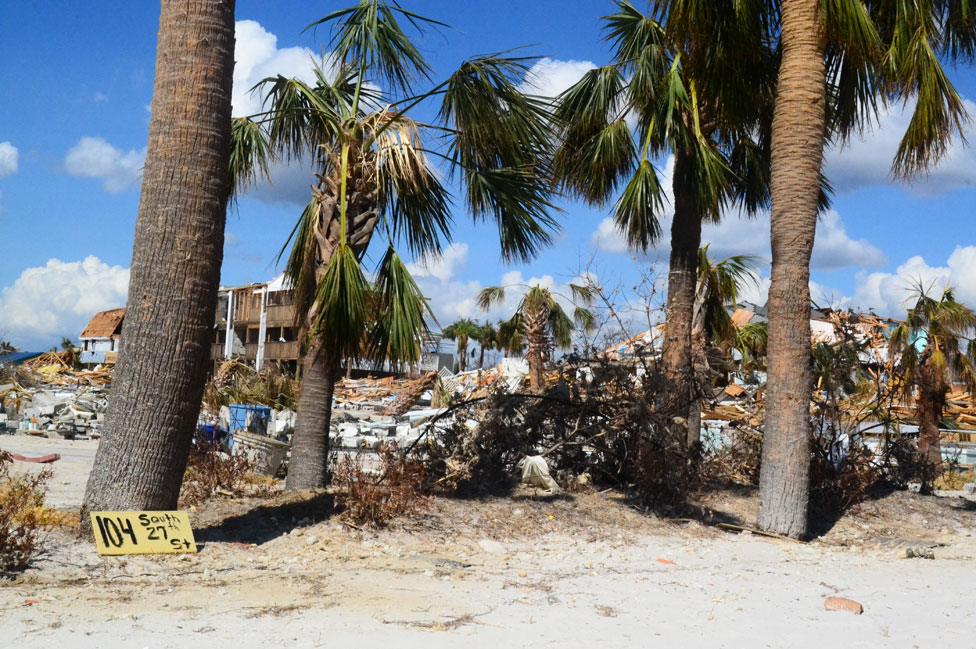
As most of the houses were completely swept away, it was almost impossible to determine where the streets started and ended

For those familiar with it, Mexico Beach had something unique. Many of its some 1,200 residents knew each other by name and the town's small, old houses gave it a picturesque feeling. It is now all gone.
Most of the buildings next to the beach were completely swept away and it was almost impossible to determine where the streets started and ended. Numbers written on cardboard were put on trees and lamp posts that resisted the hurricane, and family's names were spray-painted on surviving walls.
Across the town, some residents had put up signs saying "Loot it and I shoot". Looters, some of them armed, have been active in Bay County and officials said about 10 were arrested every night since the storm hit.

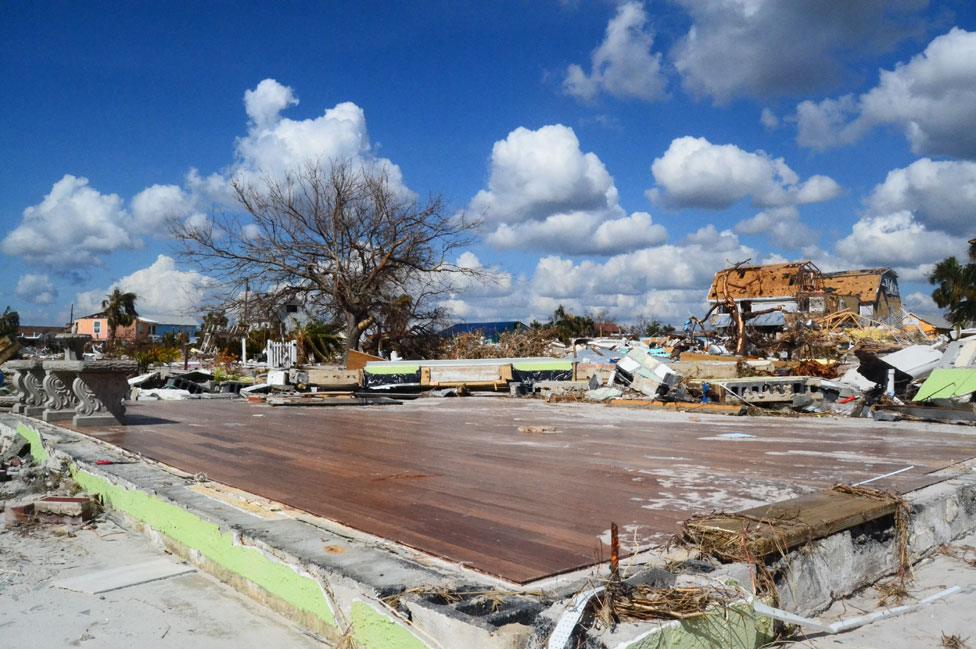
The powerful winds and the wall of water that followed helped destroy this beachfront community

One family saw their home reduced to a pile of debris scattered over a different property. Walking with them, a representative of an insurance company looked at his camera and said: "There's nothing to take a picture of."
While many of the houses were said to be insured, it was unclear if the payments would cover the costs of reconstruction following stricter - and more expensive - rules. Rebuilding the town itself will take a long time.

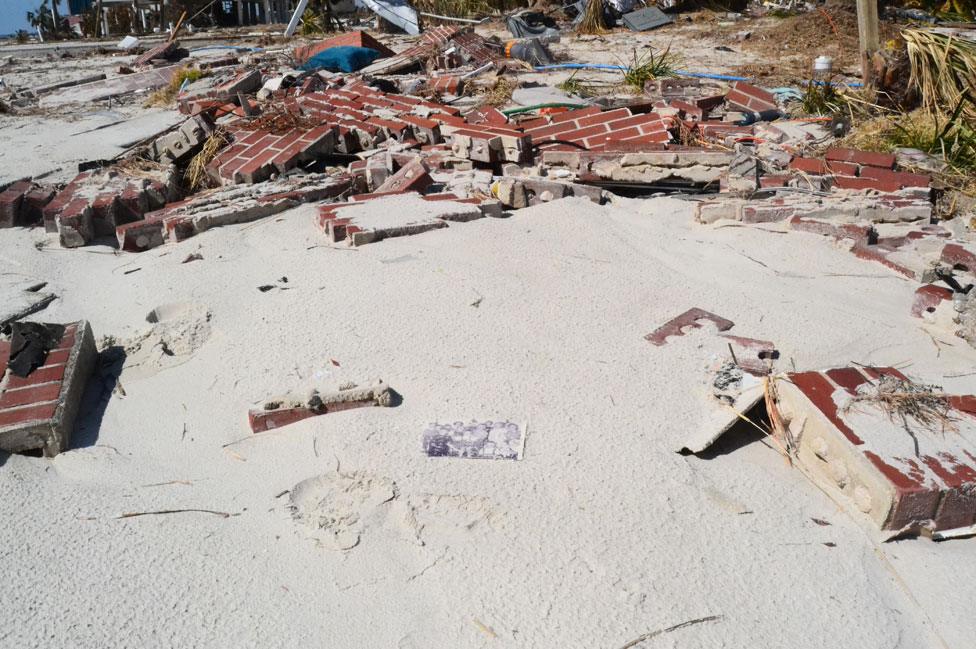
The objects being collected offered a small glimpse into the families' lives

Shortly after arriving, the Sebastião family raised a US flag in front of their neighbour's house, the wife of a former Air Force pilot who died years ago. He was once based in the nearby Tyndall Air Force Base, where hangars and other buildings were also heavily damaged by Michael.
She had asked them to search for objects belonging to her husband, "the only thing she was interested in," Mr Sebastião said. With her home almost completely destroyed, it would be no easy task. He had some hope, however, after finding his own years-old Christmas village almost intact.
"I feel like we're blessed. We still have a place, a lot of people don't," his wife said. "We still can go through stuff and find some stuff."

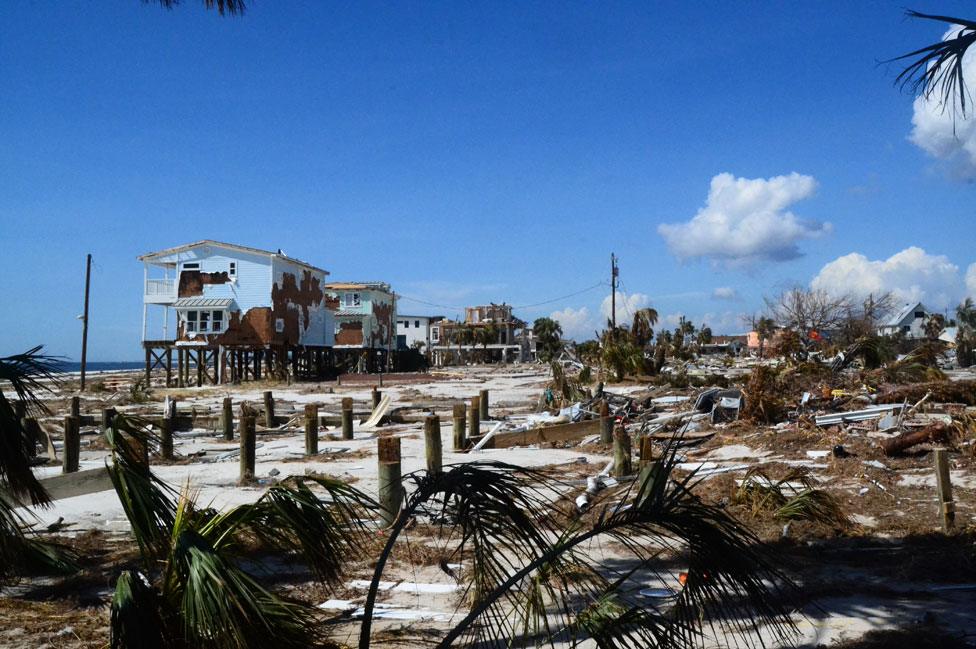
Residents have returned to destroyed homes - but some, to no homes at all

House after house, the objects being collected offered a small glimpse into these families' lives. Next to the Sebastião home, a kitchen pan had been separated near the foundations that used to sustain a building.
"We're looking for anything," said 55-year-old Shelly Breedlove. "[The pan] is not a big deal for anybody else, but it's a big deal to me." Her teenage son had found a wooden structure, probably part of a door, where children's heights had been marked.
For 20-year-old Connie Huff, whose house was now a pile of debris three minutes away from its known address, there was not much to be rescued - some items from when she was cheerleader at high school, two medals and an old picture. "I felt devastated," she said. "This place will and always will be beautiful to us and be dear to our heart."

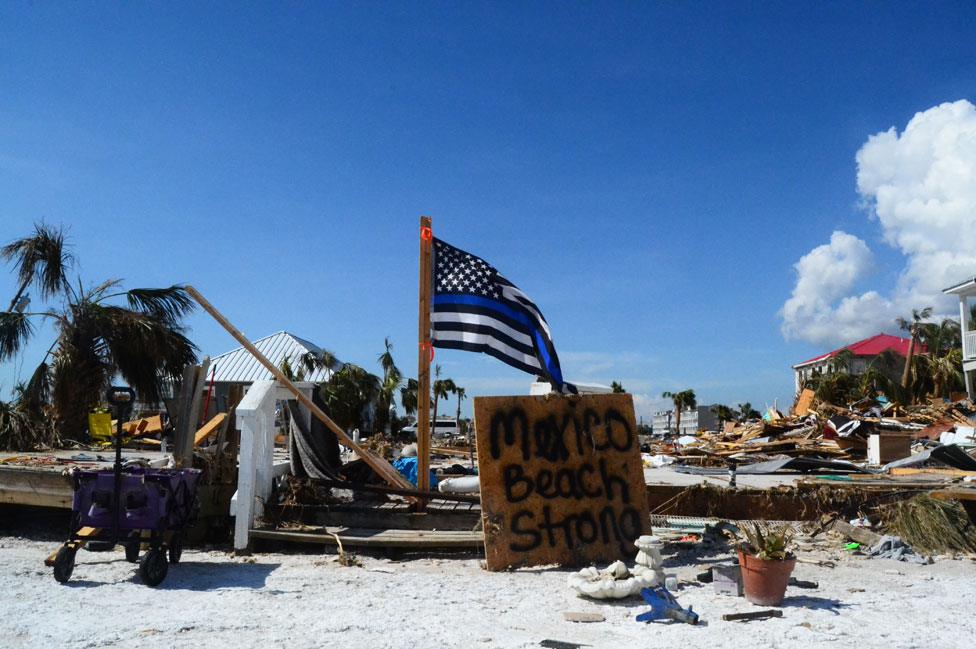
"We'll rebuild it," said Jaques Sebastião, and many of his neighbours

Outside the ruins of their house, Jaques and Bela Sebastião looked at what remained of the kitchen and joked about the cans of drinks and boxes of food that somehow stayed untouched on the top of the fridge.
"The saints," Mr Sebastião jokingly said, looking at his wife, "protected the best stuff". She laughed. "Only one payment done and Michael decided to pay us a visit."
"We'll rebuild it," he said, "but it won't be the same."
Follow Hugo on Twitter: @hugobachega, external